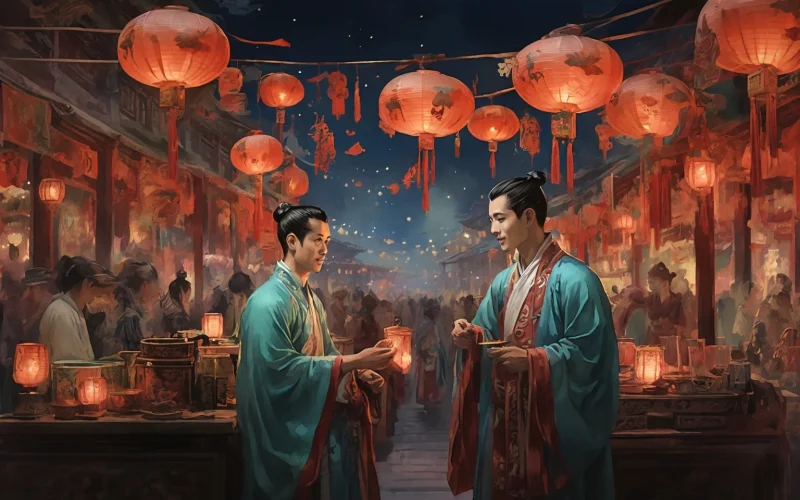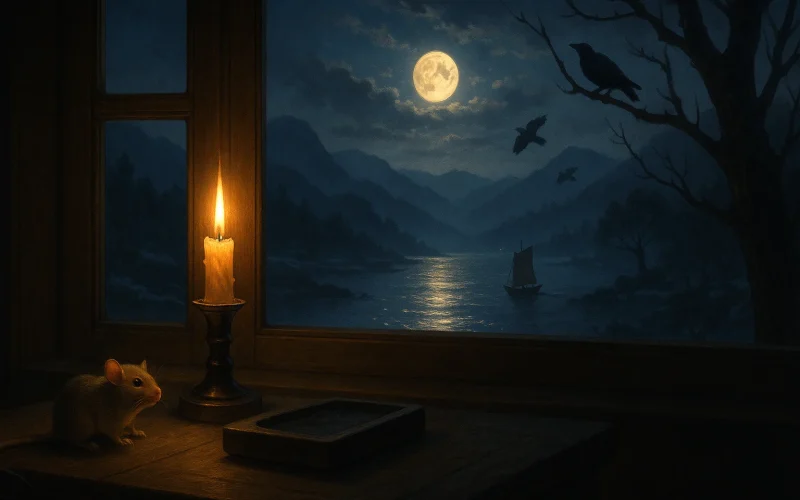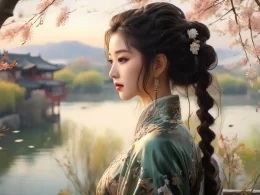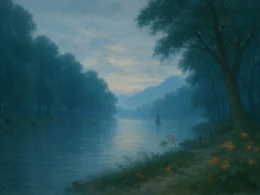Nine boulevards vomit immortal parades home,
Celestial torches rewrite sunset's chrome.
Wine's surface tension defies lunar glare,
Petals caress ministers' nano-wear.
Incense algorithms warm golden serpents,
Phoenix-fans unfold in hologram segments.
Dharma music's quantum harmonics play—
Yet they crave the vermilion hovercraft's display.
Original Poem
「和史馆相公上元观灯」
曾巩
九衢仙仗豫游归,宝烛星繁换夕晖。
传醆未斜清禁月,散花还拂侍臣衣。
天香暗度金虬暖,宫扇双开彩凤飞。
法曲世人听未足,却迎朱辇下端闱。
Interpretation
This occasional poem by Zeng Gong was composed in response to a colleague's work, vividly depicting the grand spectacle of the Shangyuan Festival (上元节, the Lantern Festival on the 15th day of the first lunar month). As one of the most magnificent celebrations in the Song dynasty, the festival saw cities adorned with lanterns and decorations, while the imperial court hosted lantern-viewing banquets and musical performances. Written during official social engagements, the poem captures the capital's nightscape with elegant and delicate brushstrokes, blending the solemnity of court ceremonies with the lively atmosphere of urban festivities. It reflects the poet's appreciation and admiration for the holiday's vibrant scenes while demonstrating his lofty aesthetic perspective and composed literary style.
First Couplet: "九衢仙仗豫游归,宝烛星繁换夕晖。"
Jiǔ qú xiān zhàng yù yóu guī, bǎo zhú xīng fán huàn xī huī.
The celestial procession returns from its joyful parade along nine boulevards; / Countless precious lanterns, shining like stars, replace the fading sunset glow.
This couplet begins with a majestic scene of the capital's streets. "Celestial procession" (仙仗) refers to the magnificent parade or lantern festival parade, while "precious lanterns shining like stars" (宝烛星繁) depicts the dazzling lights resembling twinkling stars, portraying the brilliance and excitement of the festive night.
Second Couplet: "传醆未斜清禁月,散花还拂侍臣衣。"
Chuán zhǎn wèi xié qīng jìn yuè, sàn huā hái fú shì chén yī.
Wine cups are passed around as the moon still hangs high over the serene palace; / Falling fireworks, like scattered blossoms, gently brush against the robes of court officials.
Transitioning to the palace scene, "wine cups passed around" (传醆未斜) indicates the banquet is in full swing though the night is still young. "Serene palace moon" (清禁月) refers both to the bright moon and the solemn atmosphere of the imperial court. "Falling fireworks like scattered blossoms" (散花) alludes to the fireworks display, while "brushing court officials' robes" adds a dynamic and ceremonious touch to the lively celebration.
Third Couplet: "天香暗度金虬暖,宫扇双开彩凤飞。"
Tiān xiāng àn dù jīn qiú nuǎn, gōng shàn shuāng kāi cǎi fèng fēi.
Heavenly fragrance subtly wafts from golden dragon censers, spreading warmth; / Palace fans unfold in pairs, their painted phoenixes seeming to take flight.
This couplet focuses on details and atmosphere: the lingering "heavenly fragrance" (天香) from "golden dragon censers" (金虬) creates a cozy and luxurious ambiance, while the "palace fans unfolding" (宫扇双开) reveal exquisite phoenix designs that appear to come alive, showcasing the opulence of the imperial Lantern Festival celebrations.
Fourth Couplet: "法曲世人听未足,却迎朱辇下端闱。"
Fǎ qǔ shì rén tīng wèi zú, què yíng zhū niǎn xià duān wéi.
The people cannot get enough of the sacred music's enchanting melodies, / When suddenly, the vermilion imperial carriage descends through the palace gates.
The final couplet builds upon the preceding imagery of "celestial processions," "fireworks," "fragrant warmth," and "phoenix fans," culminating in the appearance of the "vermilion imperial carriage" (朱辇)—marking the grand climax with the emperor's arrival. The poet's praise for the festival implicitly affirms the legitimacy of the imperial ritual-music system, blending admiration for the celebration with reverence for the sovereign.
Holistic Appreciation
Comprising eight meticulously balanced lines, this poem adheres to the tradition of "palace-style poetry" (宫体诗 gōng tǐ shī), showcasing elaborate descriptions without succumbing to superficial ornamentation. Through intricate details, the poet unfolds scenes of prosperity both within the palace and across the city streets: from celestial processions ("immortal retinues") to palace fireworks, from fragrant mists to the emperor's grand arrival—all converging into a magnificent nightscape brimming with festive spirit. Though composed as a poetic response, the work avoids clichés, instead blending emotion with scenery to achieve an artistry that appeals to both refined and popular tastes.
Beyond celebrating festive joy, the poem carries an undercurrent of ritual consciousness and cultural awareness. By depicting the lantern-viewing splendor of the Shangyuan Festival (上元夜), the poet extols the signs of a flourishing era while embodying the Song dynasty literati's ideals of ritual harmony and well-ordered governance.
Artistic Merits
- Palace and Marketplace United, Liveliness with Order
Juxtaposing "nine thoroughfares" (九衢 jiǔ qú) with "palace fans" (宫扇 gōng shàn), the poem interweaves civic revelry and courtly ceremonies into a multi-layered festive tableau. - Structured Elaboration, Ornate Yet Restrained
Phrases like "star-clustered precious candles" (宝烛星繁 bǎo zhú xīng fán), "celestial fragrance drifting unseen" (天香暗度 tiān xiāng àn dù), and "rainbow phoenixes soaring" (彩凤飞 cǎi fèng fēi) exemplify the Song dynasty's ornate yet disciplined literary style—lavish yet measured, polished yet never slick. - Diverse Imagery, Movement and Stillness Balanced
Fireworks, scented air, imperial carriages, and musical performances interlace dynamically, creating vivid visual and rhythmic cadences throughout the poem.
Insights
This poem’s meticulous portrayal of the Shangyuan Festival night not only reveals the vibrancy of Song dynasty holiday culture but also reflects the poet’s appreciation for the systems, civility, and order underlying such celebrations. Modern readers can still sense the rich cultural atmosphere and social harmony within its lines, reminding us that festivals are not merely occasions for joy but also manifestations of civilization. For contemporary audiences, this elegant yet jubilant depiction inspires renewed reflection on the artistic expression and intrinsic spirit of festive traditions—how they marry beauty with meaning, revelry with reverence.
About the Poet
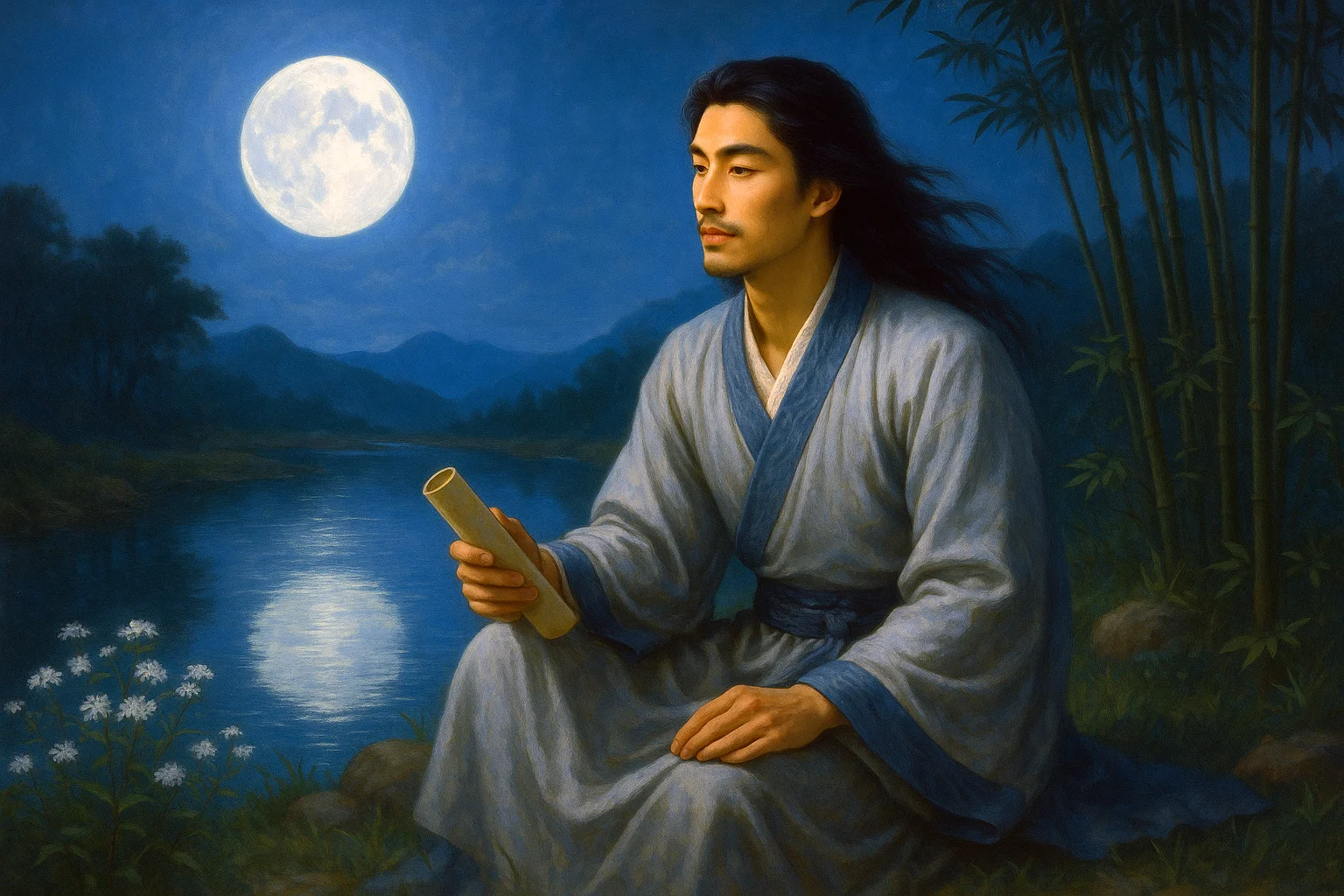
Zeng Gong (曾巩, 1019 - 1083), a native of Nanfeng in Jiangxi province, stands among the illustrious "Eight Great Masters of Tang-Song Prose." His writings distinguished themselves through an elegant classical balance, celebrated for their rigorous argumentation and refined literary craftsmanship. While his poetry embraced an artless subtlety, his prose achieved what critics hailed as "the very essence of purity" - an achievement that, though perhaps less dazzling than his contemporaries like Su Shi or Wang Anshi, earned him posthumous reverence as the founding master of the "Nanfeng Literary School."






